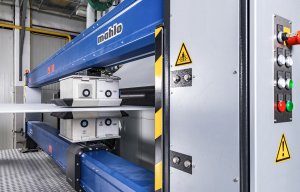
Spotlight on online process control
Company’s mLog serves as a reference for customers and suppliers alike.

14th June 2021
Innovation in Textiles
|
Saal, Germany
Digitalization and Industry 4.0 are the keys to process excellence, according to Thomas Höpfl, sales manager at Mahlo, the leading manufacturer of measuring, control and automation systems for the textile and finishing industry based in Saal, Germany.
“Today, manufacturers and equipment suppliers in the textile industry are faced with rising production and energy costs, shrinking margins, shorter production times, and higher demands on quality and flexibility,” Höpfl, who has more than 30 years of experience in the textile industry, observes. “Through digitalization, manufacturers can strengthen their production, improve their competitiveness and react more quickly to changes. Data is now the most important factor in the production process. It provides manufacturers with everything they need to know about their goods but is only of any use if it is analysed and processed in a meaningful way. To do this, a system of intelligent networking must exist between people, machines, and processes in production. For our customers, we have developed the cross-platform mSmart system for use with Mahlo machines.”
Data in real time
Goods that pass through a production line constantly bring information with them in the form of process parameters such as distortion, temperature, yarn density, weight and residual moisture, Höpfl adds. Suitable measuring systems record these values. Using Industry 4.0, the systems are able to communicate in real time with other machines that use this info to control the fabric.
Intelligent networking must exist between people, machines, and processes
“Real-time management is the main actor of digitalization and brings immense benefits,” says Höpfl. “These include more consistent products, better control, less scrap, and less raw material consumption. The direct consequences are lower costs and higher product quality, which in turn increases customer satisfaction.”

Through the optimised processes and resulting reduction in unnecessary material consumption, digitalization also creates opportunities to contribute to sustainability – from raw materials to finished garments.
“This is becoming increasingly important, especially among end customers,” Höpfl stresses.
mLog
At Mahlo, data management is handled by the newly developed mLog software.
“With this analysis tool, the manufacturer can track when something was handled, where it was handled, in what quality and with what efficiency throughout the entire production process,” Höpfl says. “It is precisely this data that makes the production process transparent by serving as a reference for customers and suppliers alike. The exact logging of process data is also always an insurance against unjustified lawsuits or devaluations of goods.”
Not to be neglected is the time-saving factor, he adds.
“In the digital age, no one has to wait for printed reports – managers can access data in real time and on-demand from anywhere in the world.”
Maintenance management
Seamless networking is not only required within a company’s own production, but also externally, such as within the service department of the machine supplier.

“If a problem occurs at the plant, every minute of downtime costs money,” Höpfl says. “Quick access via remote maintenance saves time and money, since a technician does not have to travel to the site first, but many things can already be solved in remote mode.
“In the mLink module, for example, Mahlo combines all tasks related to networking, data exchange and communication with the machines. In this way, intervention is possible at any time when the customer needs support.
“The age of Industry 4.0 is advancing,” Höpfl concludes. “In order not to miss the boat, textile manufacturers must redesign their manufacturing processes in the direction of a digital production system. Even if implementation brings challenges, this is the right path into the future.”

Business intelligence for the fibre, textiles and apparel industries: technologies, innovations, markets, investments, trade policy, sourcing, strategy...
Find out more